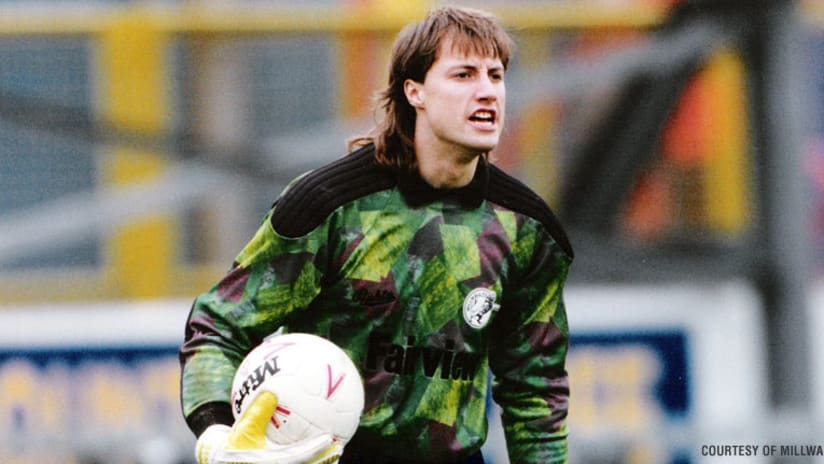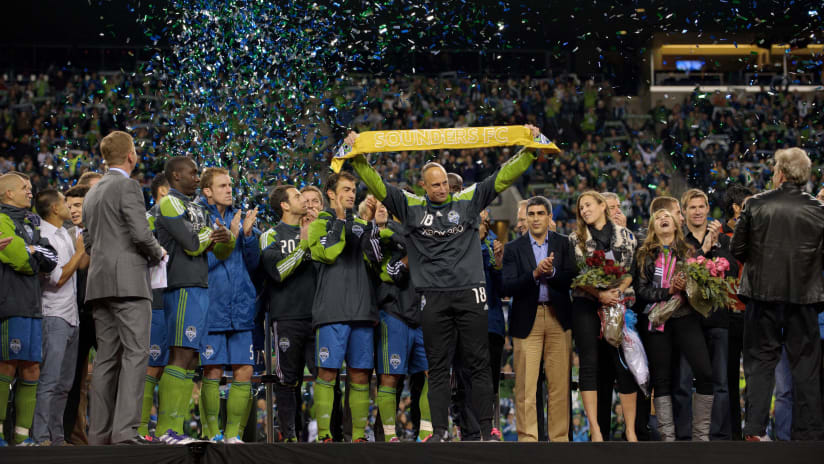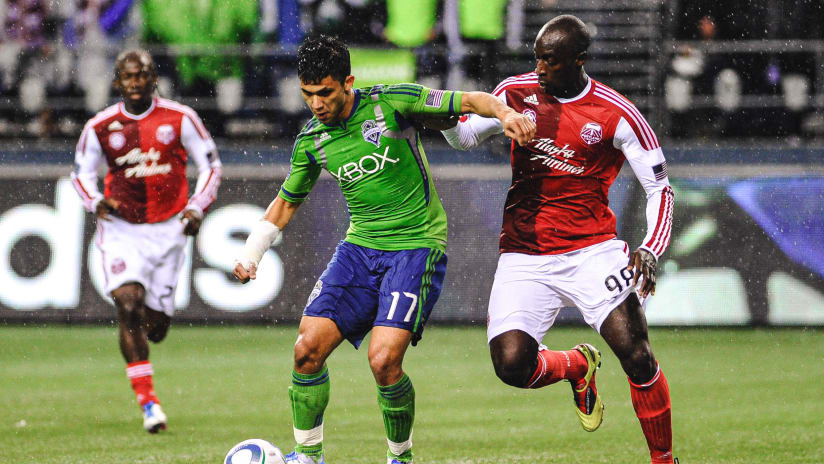20 years ago today, Kasey Keller became the first soccer player to play a match in Europe while signed under an American passport, opening the door for many to follow.
On May 2, 1992, Kasey Keller stepped onto the field at Millwall and quietly made history.
Keller, then 22 years old, was the first soccer player to sign and play in England on an American passport, opening the door for other American players to follow in his path for years to come.
Wednesday is the 20th anniversary of that match and the goalkeeping legend and Sounders FC broadcast analyst took some time to recall that now historical match.
In December of 1991, he went to Millwall on a one-month trial. After impressing manager Bruce Rioch, whom Keller watched with the Sounders in the North American Soccer League, he reached an agreement to a contract, but had to wait six weeks until his work permit was approved. On Valentine’s Day, 1992, he finally signed a contract with the second division club. Not long after, Rioch was fired at Millwalll, replaced by Mick McCarthy.
“I’d signed, I got here and I’m trying to prove myself and now the guy that signed me is fired,” he said. “What is the new guy going to think?”
The new boss soon gave Keller the chance to prove himself, starting him in the final match of the season against Southend United. Safe from relegation, McCarthy had nothing to lose by starting the young prodigy.
On the surface, there was no pressure, as Millwall and Southend were both sturdy in their positions in the league standings.
Keller, on the other hand, had the fate of young American soccer players riding on his shoulders. A successful match would buy him time to prove himself among some of the best at his position. Failure, however, might hinder the opportunities of other Americans who would undoubtedly follow.
He did his best to shield himself from that pressure and came out victorious with a 2-0 win to finish off the 1991-92 season, earning the chance to mind the goal for Millwall in the 1992-93 season.
While lacking much significance to the club and the league, that clean sheet was a whisper through a megaphone for Keller.
“I didn’t have a lot to do. I had to make one good save and everything else was pretty steady,” he said. “When it was over, I knew I could do it. I was a pro and I’d played and I’d won. I kept a clean sheet. I could do this. I was able to go into the vacation knowing that I could do it. I could play in what is now the Championship and be successful.”
Any relief at his accomplishments was short-lived, though. Keller would need to maintain a consistent role with Millwall to retain his work visa. If he couldn’t win the starting job, his stay at Millwall would be over.
He not only stayed with the club, but started nearly every match during the season, planting his stake in Europe and opening doors for the myriad other players to follow.
“Kasey was bold enough to go and make that move and at that time it was very difficult for an American player to go overseas and try make it,” said Sounders FC technical director Chris Hendreson, then a 23-year-old … “People were really hoping that he would do well.”
Whereas current American standout Clint Dempsey has become a media focal point, Keller flew mostly under the media radar at the time.
“Unless a reporter took a trip over there, you never really got stories about how guys were doing over there,” Henderson laughed at his desk at Starfire, where he now tracks players at various levels all around the world from his cellular phone and desktop computer. “It was tough to keep track of how he was doing, week-to-week.”
Keller would maintain a high standard of play for 17 years in Europe, playing at multiple levels in England, Germany and Spain before returning home in 2009 with the Sounders FC for the final three years of his career, retiring after the 2011 season.
And while his tremendous success abroad opened doors for players that followed, he hardly views himself as a trailblazer who smashed through impenetrable walls to make things easier for the players that followed.
“It opened up some eyebrows for other guys to be looked at,” he said. “But you still have to have the quality. Now, American goalkeepers aren’t being looked over, but they still have to be good enough.”
For most of his first three full seasons in Europe, he was a bit of an oddity, frequently being asked by media how an American was able to succeed at such a high level. Then, unexpectedly, he was asked by a reporter about the influx of foreign players in England.
“You don’t count,” he was reassured.
The American soccer player has certainly become more commonplace abroad since Keller breached the barrier of players on an American passport playing in Europe.
However, it is still a long way from a scenario where players like Keller and current Fulham star Clint Dempsey are the rule, rather than the exception.
“I was always going to be on the outside looking in,” Keller said. “When the manager had to go to the board to ask for a couple million pounds to buy a player, it was tough to convince them to buy an American. It’s a huge hurdle that still probably hasn’t been breached.”
That hurdle may not yet be in the rearview mirror, but if not for Keller’s start on May 2, 1992, there’s no telling what the state of the American soccer star would be.
NOTE: The text in the second paragraph has been edited to reflect that he was the first to sign in England. Tony Meola had played there on loan prior to Keller's arrival, but never signed.





